Focus Issue
SK innovation conducts materiality assessment to identify and manage material issues related to ESG.
 SK innovation identifies three material issues from the list of issues identified from our multi-faceted analysis
SK innovation identifies three material issues from the list of issues identified from our multi-faceted analysis
based on the impact on stakeholders and the relevance to our business.

SK innovation conducted materiality assessment to identify material issues for a sustainable management.
The pool of issues were organized based on internal and external environmental analysis such as international standard analysis,
benchmarking of leading companies and media research. The materiality assessment results were identified by calculating the impact on stakeholders and
relevance to business of the selected issues.

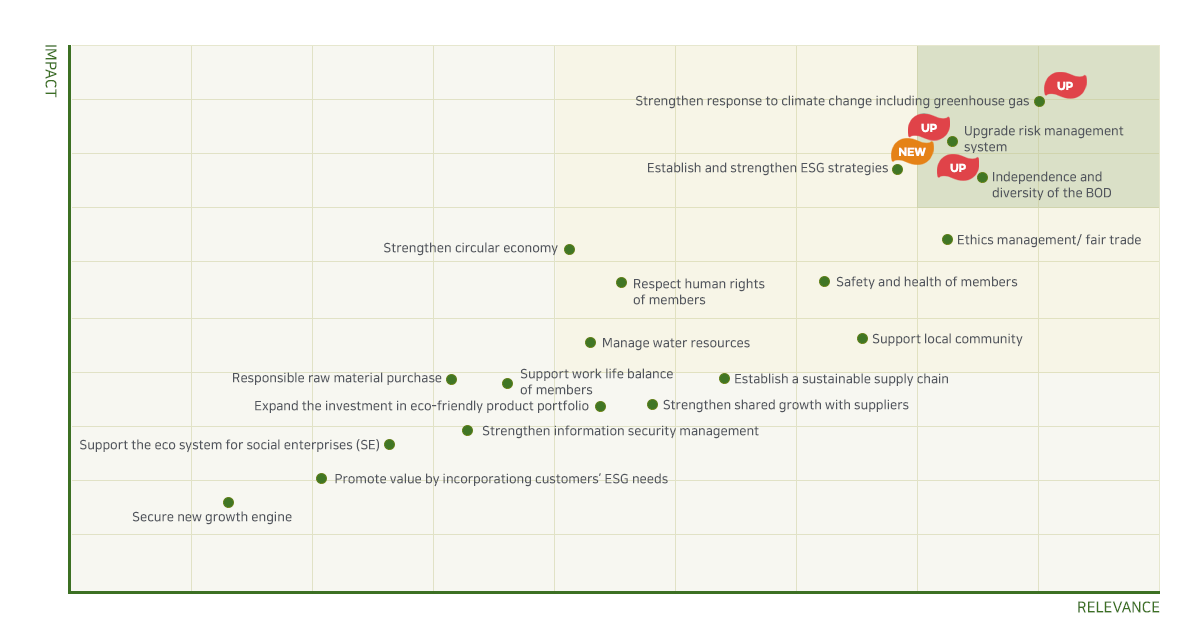
-
Setting the greenhouse gas emissions goal through
Net Zero roadmap (Green Transformation)SK innovation is making its utmost efforts to meet the requirements of internal and external environments based on Nationality Determined Contributions (NDCs) of the Korean government and Paris Agreement to reduce greenhouse gas emissions, a global issue. We established the goal of achieving net zero for total greenhouse gas emissions (Scope 1&2) generated in the process of operating business sites by 2050, specified tools to reduce emissions and present specific implementation roadmap. Moreover, we have established a clear goal for greenhouse gas emission that is generated across the value chain from raw material purchase to consumption behavior, going beyond simple management. To achieve this goal, we are making an efforts such as strengthening cooperation with supply chain and expanding eco-friendly portfolio.
-
Expanding eco-friendly portfolio
(Green Anchoring)SK innovation is expanding its eco-friendly product and business portfolio based on differentiated technologies and capabilities. It is expanding eco-friendly product portfolios through green innovation of existing products such as eco-friendly asphalt, lubricating oil and plastic. In addition, it is securing growth engine with continued attention and efforts for new eco-friendly business which can significantly contribute to solving urgent environmental issues in our society including climate change with battery and material business which are growing rapidly and hydrogen, CCS, energy solution and recycle.
-
Management of energy and greenhouse gas emissions at the workplace
SK innovation manages energy consumption and greenhouse gas emissions at all business sites systematically. We use OASIS, the next generation production information system, developed based on standardization of master data to monitor energy consumption and produce greenhouse gas emissions data at all sites based on the Guideline for Reporting and Certification of Emissions in the Greenhouse Gas Emissions Trading Scheme presented by the Korean government. And the data are verified by a third-party agency to secure transparency and objectiveness. From 2021, we are developing control indicators and verification process according to global standards with a plan to expand our control scope to emissions from supply chain and products (Scope 3). We are also separately reviewing plans on managing overseas business sites in line with the relevant national law in which the sites are located.
-
Climate change management system
-
SK innovation reports and resolves important issues related to climate change at the BOD and plans to establish a more professional and strengthened management system by establishing ESG Committee under the BOD. Internally, we organized ESG Design Team composed of C-level executives, heads of each business and function to share information on ESG issue, discuss and identify ways to solve problems and explore ways for cooperation. ESG Design Team selects and manages various agendas to respond to climate change such as climate change risk check, monitoring of greenhouse gas emissions reduction plan and implementation status and review new eco-friendly technologies and business opportunities through monthly and occasional meetings. In addition, we incorporated climate change response target and performance in key performance indicators (KPI) of CEO and major executives and have the evaluation and reward system in relation to the KPI to make sure that the discussion and decision-making on climate change can be translated into actual implementation. (In 2021, SK innovation is taking a bold step toward incorporating a meaningful portion(i.e. up to 20%) of ESG-related measures in CEO and executive KPI evaluation, which will be incorporated into CEO and executive compensation schemes.) In addition, we are actively pursuing ESG improvement by establishing internal ESG KPI system based on matters expected by external stakeholders such as ESG evaluation agency.
-
Establishment of the global pandemic response system Establishment of the global pandemic response system
SK innovation made an effort to remove the risk in the company and society amid COVID-19 pandemic situation in 2020. Externally, we provided support for quarantine activities through safety net and resolution of social issues caused by COVID-19 and internally, we responded to changes in the market flexibly. SK innovation will secure the sustainability of the company and the society by responding to social risk closely.
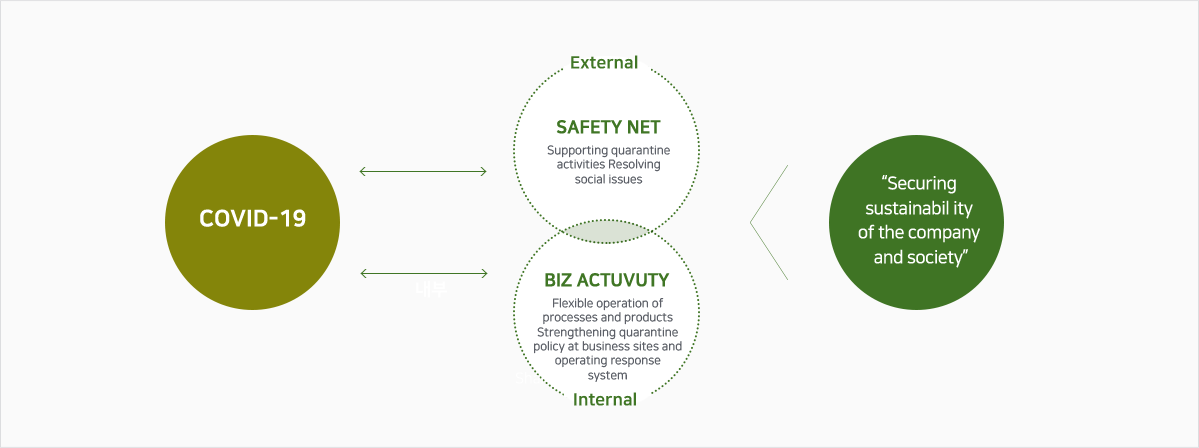
BIZ. ACTIVITY
(Response to external risk at the business level)
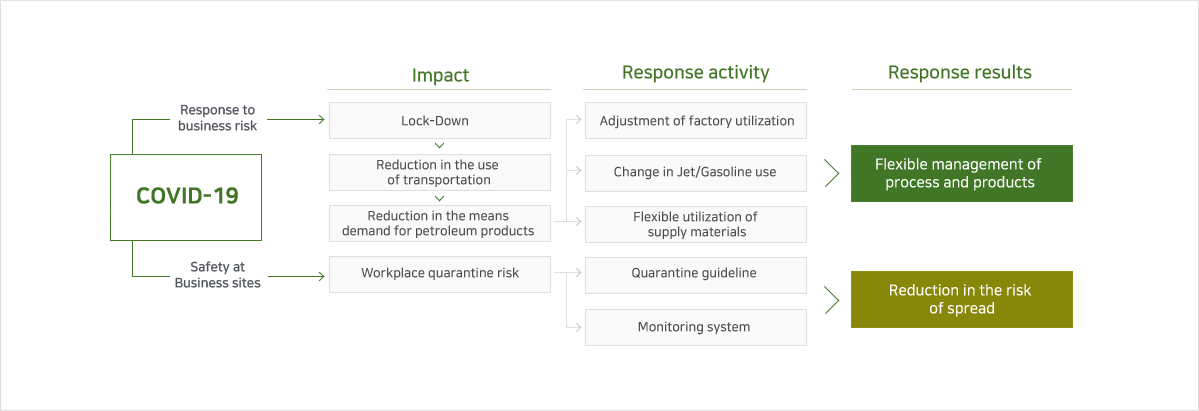
Response to business risk
In line with the rapidly changing market environment due to COVID-19, SK innovation implemented various response activities in a timely manner by adjusting process utilization rate and change in the type of oil produced as well as identifying new options for the operation of process and products to respond actively to the reduction in the demand for petroleum products and margin.
Securing safetyat business sites
-
HQ and branch offices
SK innovation operated ‘Guide to COVID-19 prevention in daily lives’ with the goal of preventing the spread of the virus among employees at HQ and branch offices. If there are confirmed cases or employees subject to quarantine measures, we are conducting measures for evacuation, classification of those in contact with positive people and quarantine measures. Essential quarantine rules to follow are established and monitoring and giving instruction are conducted every week to check whether essential rules are followed or not.
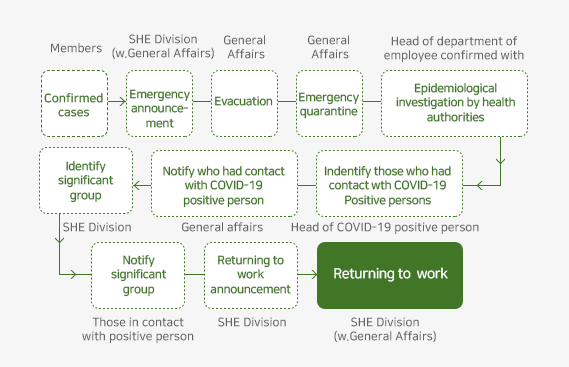
-
Domestic and overseas business sites
In order to minimize the damage caused by the shutdown of business sites due to the COVID-19 infection and to ensure stable operation of the business sites, each business site of SK innovation is systematically conducting monitoring and response activities. Overseas businesses such as the U.S., Hungary, and Poland have established a system by the characteristics of each region and are conducting response activities based on it. In collaboration with government and private medical institutions, We worked on preemptive vaccinations for the number of people staying in the workplace. An emergency response committee was formed to protect the number of existing residents through systematic response activities, and to prepare scenarios for the occurrence of infections.
-
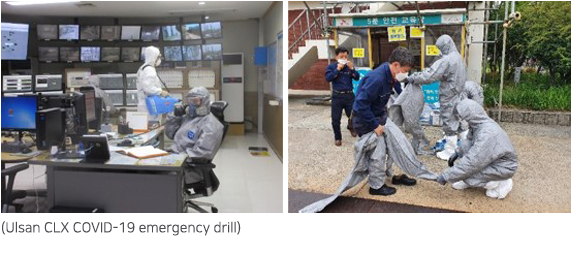
Establishment of ‘actual’ BOD-driven management system
| Governance innovation orientation | Strategic direction | |
|---|---|---|
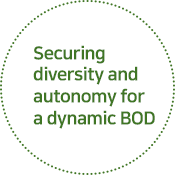 |
“Improving diversity in terms of gender, age, race, ethnicity, etc. and operating the BOD driven by outside directors” |
ㆍSecuring diversity of the BOD ㆍStrengthening the autonomy of the BOD ㆍStrengthening the accessibility of the BOD to information |
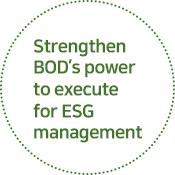 |
“Strengthening the role of the Future Strategy Committee and establishing ESG Committee” |
ㆍExpanding the Future Strategy Committee ㆍEstablishment of the ESG Committee |
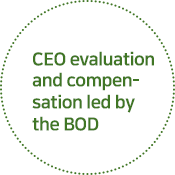 |
“Giving the right to evaluate and compensate CEO to HR Evaluation and Compensation Committee” | ㆍReviewing evaluation, compensation and succession of CEO |
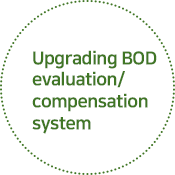 |
” Re-establishment of BOD evaluation and compensation system with strengthened role of outside directors and strengthening communication led by BOD.” |
ㆍEstablishment of BOD evaluation and compensation system ㆍStrengthening BOD’s communication with the financial society |
Upgrading BOD-driven global compliance response system
| Governance innovation orientation | Strategic direction | |
|---|---|---|
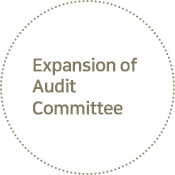 |
“Expanding the role of existing Audit Committee to respond to corporate compliance and risk” |
ㆍExpansion of the Audit Committee |
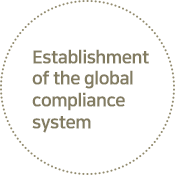 |
“Promoting the establishment of global compliance system for the systematic management of compliance risk” |
ㆍEstablishment of global compliance system ㆍEstablishment and operation of global compliance program |

